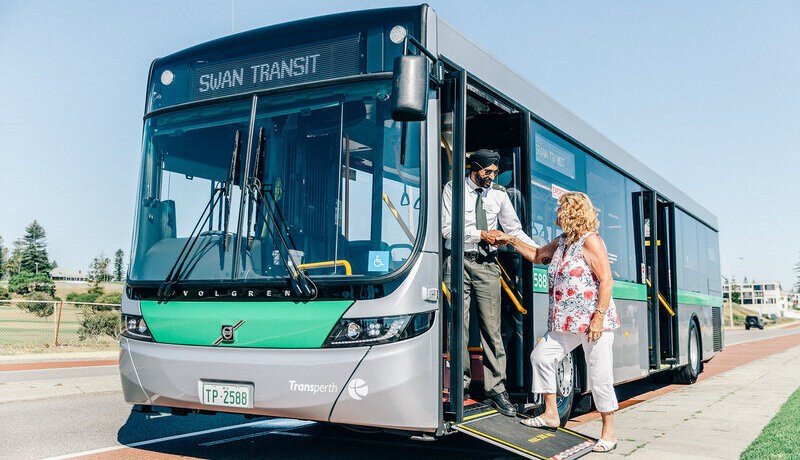STAGECOACH CARRIES OUT 1ST TRIALS OF NEW £4M BRIDGE ALERT TECHNOLOGY IN CAMBRIDGE
- UK-wide roll underway across 4,000 double decker buses following successful trials in Cambridge
- New GreenRoad technology uses GPS data and mapping to alert bus drivers to low bridges
- Stagecoach first bus operator to invest in national deployment of industry-leading software
- Investment welcomed praised by Senior Traffic Commissioner for East of England
- 18,000 low bridges across the UK mapped into the new system
(August 12, 2021) Industry-leading new bridge alert technology has been successfully trialled by Stagecoach on its buses in Cambridge, one of Europe’s leading technology hubs. The new technology will now be installed on around 4,000 double decker buses and high coaches across England, Scotland and Wales as part of a £4million investment.
Stagecoach is the first bus operator in the country to invest in the full national roll-out of this new technology which will strengthen existing safety measures in place to prevent bridge strikes and build on its industry-leading use of the GreenRoad driver safety and fuel efficiency system.
The intelligent GreenRoad system uses GPS vehicle location data and mapping services to alert the bus driver to nearby low bridges. If the technology determines that the bus is heading towards a low bridge, it will sound an in-cab alert, allowing a safe exit route that avoids the bridge.
Training and briefing is now getting underway for Stagecoach’s engineers and drivers to help them install and use the new software. Around 18,000 low bridges across the UK are being mapped into the new system in advance of the full roll-out of the technology expected by late summer 2021.
Data published by Network Rail shows that there were 1714 railway bridge strikes across the country in the 2019-20 financial year. Most of these incidents involve heavy goods vehicles (HGVs), with between 40 and 50 a year related to buses.
As well as the potential for serious injuries, bridge strikes have significant financial and other costs for the country. On average, a single bridge strike costs more than £6,000 and in 2019-20 these incidents resulted in more than 7,800 hours of delays for rail passengers alone.
The new technology will enhance the range of existing safety measures in place, including the design of bus routes to avoid low bridges, detailed classroom and practical route training for drivers, and ongoing work with authorities to ensure the placement of appropriate signage and other alerts.
Darren Roe is the Interim Managing Director for Stagecoach East, where the first trials of the new technology have been taking place. He said: “Everything we do is designed to make our services easier and even safer to use, for our customers, our colleagues, other road users and the general public.
“Stagecoach has a strong track record of delivering innovation. Our major investment in this cutting-edge new technology is a clear demonstration of us going one step further to deliver an industry-leading initiative to further enhance the safety systems we have in place.
“As one of Europe’s leading technology hubs, it’s very fitting that we have chosen Cambridge for the first trials of this new software. Now that the trial is successfully complete, we will start rolling out the technology across our fleet of around 200 buses in Cambridge, Peterborough and Bedford as well as supporting the UK wide roll-out.”
Richard Turfitt, Senior Traffic Commissioner for the East of England, who visited Cambridge depot to see a trial of the technology, said: “Bridge strikes have rightly become the subject of national focus. It is essential for operators and transport managers to ensure that their vehicles are operated without the potentially serious consequences of a bridge strike.
“Traffic Commissioners have spent considerable effort in drawing attention to these risks so operators can reduce those risks as far as is possible. That is why I was interested in the steps being taken by Stagecoach and to learn more about its innovative bridge alert technology, which was trialled in my traffic area. It is in everybody’s interests to have a safe and reliable bus fleet, so I look forward to a successful roll out across the country.”
Richard Hemming, GreenRoad’s Vice President of Customer Success, said: “We applaud Stagecoach for its total commitment to safety and its pioneering investment in safety telematics. We are proud of the results that our Low Bridge technology has achieved so far in Cambridge and look forward to extending the rollout across Stagecoach’s operations throughout the UK.”
Stagecoach is continuing to make major investment in new technology to help improve the service it offers customers. Earlier this year, it announced investment in new technology to help plan the bus networks of the future to match the changes in how people travel coming out of the Covid-19 pandemic. New digital systems have also been introduced to manage the maintenance of its bus fleet, which is helping to provide greater availability and boost reliability, and it has delivered Britain’s biggest transit contactless programme.
Contact Information
Leah Watts at Astley Media on 01392 267394 or leah.watts@astleymedia.co.uk
Richard Hemming Richard.Hemming@greenroad.com





